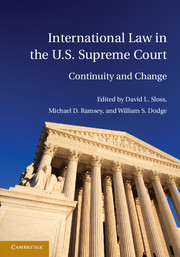Book contents
- Frontmatter
- Contents
- List of Contributors
- Table of Cases
- Acknowledgments
- Introduction
- PART I FROM THE FOUNDING TO THE CIVIL WAR
- PART II FROM THE CIVIL WAR TO THE TURN OF THE CENTURY
- PART III FROM THE TURN OF THE CENTURY TO WORLD WAR II
- PART IV FROM WORLD WAR II TO THE NEW MILLENNIUM
- PART V INTERNATIONAL LAW IN THE U.S. SUPREME COURT IN THE TWENTY-FIRST CENTURY
- V.A TREATIES AFTER 2000
- V.B CUSTOMARY INTERNATIONAL LAW AFTER 2000
- Main Essay – Sosa and the Derivation of Customary International Law
- Response Essay – “Cheap Talk” about Customary International Law
- Response Essay – History, Ideology, and Erie v. Tompkins
- V.C INTERNATIONAL LAW AND CONSTITUTIONAL INTERPRETATION AFTER 2000
- V.D INTERNATIONAL LAW AND STATUTORY INTERPRETATION AFTER 2000
- V.E INTERNATIONAL LAW AND THE WAR ON TERROR
- VI CONCLUSION
- Index
- References
Main Essay – Sosa and the Derivation of Customary International Law
Published online by Cambridge University Press: 05 July 2011
- Frontmatter
- Contents
- List of Contributors
- Table of Cases
- Acknowledgments
- Introduction
- PART I FROM THE FOUNDING TO THE CIVIL WAR
- PART II FROM THE CIVIL WAR TO THE TURN OF THE CENTURY
- PART III FROM THE TURN OF THE CENTURY TO WORLD WAR II
- PART IV FROM WORLD WAR II TO THE NEW MILLENNIUM
- PART V INTERNATIONAL LAW IN THE U.S. SUPREME COURT IN THE TWENTY-FIRST CENTURY
- V.A TREATIES AFTER 2000
- V.B CUSTOMARY INTERNATIONAL LAW AFTER 2000
- Main Essay – Sosa and the Derivation of Customary International Law
- Response Essay – “Cheap Talk” about Customary International Law
- Response Essay – History, Ideology, and Erie v. Tompkins
- V.C INTERNATIONAL LAW AND CONSTITUTIONAL INTERPRETATION AFTER 2000
- V.D INTERNATIONAL LAW AND STATUTORY INTERPRETATION AFTER 2000
- V.E INTERNATIONAL LAW AND THE WAR ON TERROR
- VI CONCLUSION
- Index
- References
Summary
My charge in this brief essay is to assess the implications of the recent U.S. Supreme Court decision in Sosa v. Alvarez-Machain for customary international law in American jurisprudence. Sosa is in an important sense sui generis, because it involved customary international law in the context of the Alien Tort Statute (ATS), to which the Court gave substantial consideration for the first time. Nevertheless, if one is given a little latitude for extrapolation, it is interesting to analyze the Court's statements for their broader resonance about the derivation of customary international law in American jurisprudence. After all, since making the Delphic declaration more than a century ago in The Paquete Habana that international law “is part of our law,” the Court has made few direct pronouncements on customary international law's status or its method of derivation. Given the paucity of customary international law analysis in any context, Sosa's explicit discussion of the transformation of common law since the Founding and its implicit recognition of changes in the nature of customary international law may well turn out to be of substantial importance for customary international law's future within American law generally.
Viewed at a high level of abstraction, Sosa represents an attempt to translate the status of customary international law in American jurisprudence from the Framers' world to our own.
- Type
- Chapter
- Information
- International Law in the U.S. Supreme Court , pp. 481 - 493Publisher: Cambridge University PressPrint publication year: 2011
References
- 1
- Cited by



